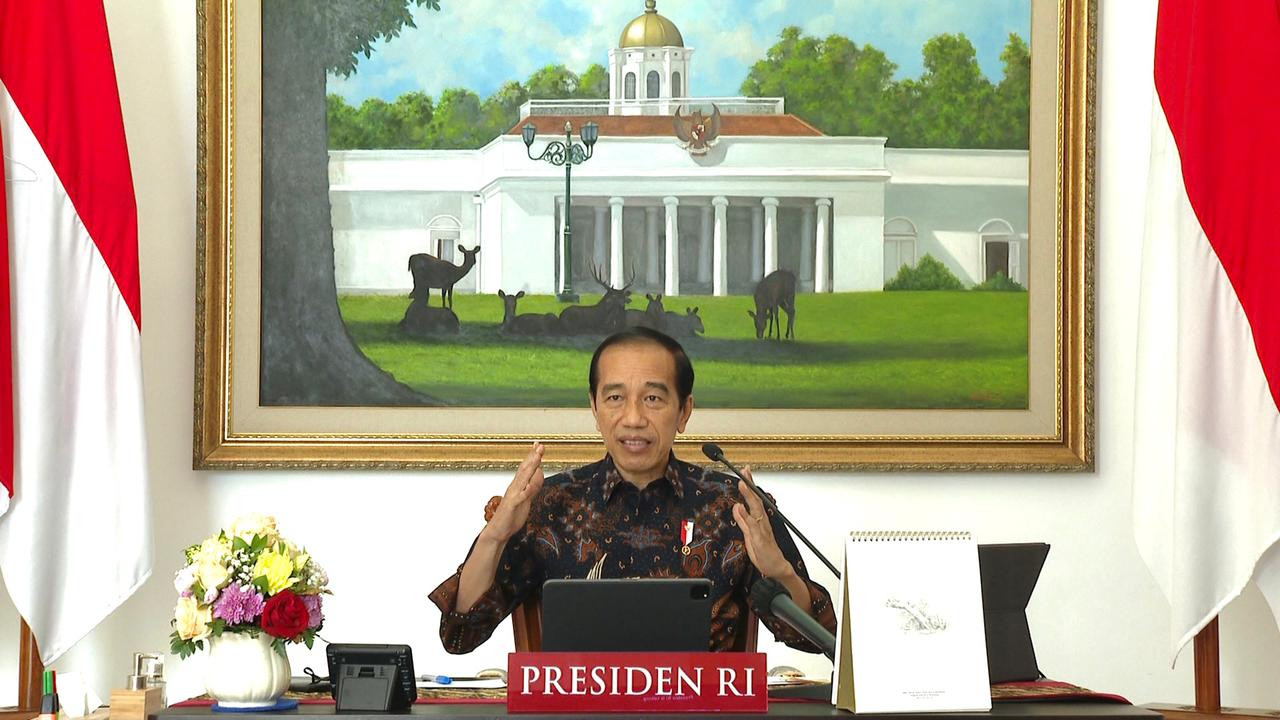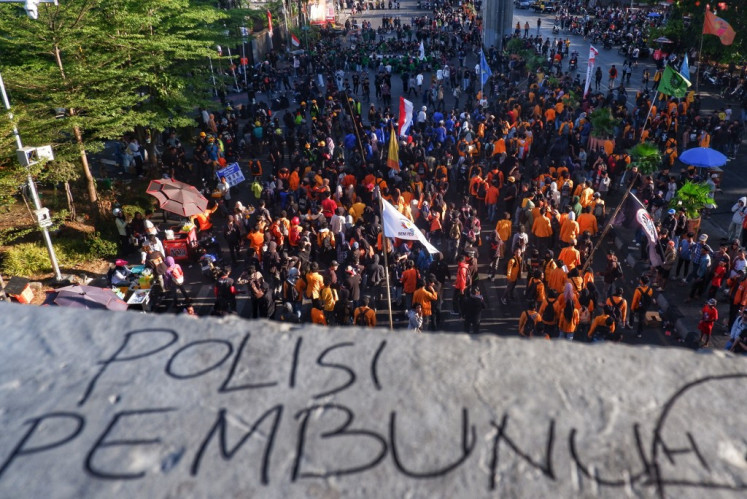Popular Reads
Top Results
Can't find what you're looking for?
View all search resultsPopular Reads
Top Results
Can't find what you're looking for?
View all search resultsPandemic tests President Jokowi's grip on ruling coalition
Dissenting voices from political parties and within the legislature are growing louder alongside a significant fall in the public's approval for the President's "pandemic performance", leading to observations that the coalition government could be on the brink of fracturing, especially amid the competing interests aiming for 2024.
Change text size
Gift Premium Articles
to Anyone
I
ndonesia’s ruling coalition is at risk of fracturing, with President Joko “Jokowi” Widodo suffering a hit to his approval rating and continuing to rely heavily on members of his inner circle in handling the COVID-19 crisis.
Jokowi had succeeded in consolidating power at the outset of his second term in office by accommodating the various interests of political parties, ensuring that the government could realize its agenda for the next five years.
But these gains are now under strain as public dissatisfaction grows over the government’s policy inconsistency with regard to the raging pandemic, prompting parties to rethink whether to stay in the coalition at the risk of jeopardizing their electability in the 2024 presidential race.
Meanwhile, Jokowi’s overreliance on his closest confidants has taken away opportunities for other officials to shine, which could create a sense of perceived favoritism in a coalition government that was patched together amid a climate of sociopolitical divisiveness dating back to Jokowi’s first term.
Pandemic clique
Since the pandemic emerged, Jokowi has turned to certain ministers to head the country’s pandemic response, namely Coordinating Maritime Affairs and Investment Minister Luhut Binsar Pandjaitan, Coordinating Economic Affairs Minister Airlangga Hartarto and State-Owned Enterprises (SOEs) Minister Erick Thohir.
And when the country began to see an alarming surge in COVID-19 cases in early July, just weeks after the Idul Fitri holiday, the President appointed Luhut to spearhead a task force to manage the emergency public activity restrictions (PPKM Darurat) across Java and Bali, with a mission to suppress the transmission rate to 10,000 new cases per day.
In a commentary published on the S. Rajaratnam School of International Studies (RSIS) website, political scientist and RSIS research fellow Alexander Raymond Arfianto writes that Luhut’s appointment “indicates that as the ongoing surge increasingly threatens his legacy, Jokowi is placing more trust on Luhut – his long-time political ally and confidant – more than on any other member of his cabinet”. Further, Alexander says that it “is also perceived as a rebuke” to both Airlangga and Erick.
Other experts noted that appointing strongman Luhut to helm the task force had helped instill some measure of discipline throughout the central and regional administrations.
“Luhut is a figure with an iron fist. This is what I think is the important [factor] for him being picked,” said political observer Wasisto Raharjo from the Indonesian Institute of Sciences (LIPI).
As a retired Army general, Luhut also provided a crucial link to the Indonesian Military (TNI), which the government had been relying on more to assist in its pandemic response.
On the other hand, some observers have warned that Luhut’s presence could easily spark envy and grievances among coalition parties eager for an opportunity to prove themselves in view of the 2024 elections.
Losing the spotlight
It seems that cracks have started to appear among the existing political fault lines.
House of Representatives Speaker Puan Maharani of the ruling Indonesian Democratic Party of Struggle (PDI-P), who is also the daughter of the President’s main backer and PDI-P chair Megawati Soekarnoputri, has been growing more vocal in her criticism of the government's pandemic response.
From the slow distribution of vaccine supplies to halting incentives for health workers, Puan has expressed her disapproval over how the Jokowi administration has handled the crisis.
Two outspoken PDI-P lawmakers, Effendi Simbolon and Masinton Pasaribu, echoed Puan’s disapproval publicly last week. Effendi accused Jokowi of “violating the Constitution” for not imposing a lockdown at the start of the pandemic, while Masinton slammed Luhut for being “too reactionary”.
Asked about the party’s stance, PDI-P senior politician Hendrawan Supratikno told The Jakarta Post last Thursday that the ruling party was and remained committed to standing behind the government.
Observers sensed a different undertone, however, that the ruling party could be sowing the seeds of internal opposition that could fragment the coalition government.
Adi Prayitno, executive director of pollster Parameter Politik Indonesia, believes that the PDI-P’s uncharacteristic attack on the President stemmed from the lack of a power-sharing approach, noting that Jokowi had not appointed any figures from the ruling party to lead any part of the government's COVID-19 response.
“It seems that the pandemic is being handled mostly within the Cabinet circle. Whereas in a presidential multiparty system like ours, any political decisions, including on who should take charge of the [current four-tier] PPKM, should be communicated to the party elites,” said Adi.
Adi added that, at the same time, Puan’s increasingly vocal criticism could be seen as a move to distance herself from the current administration in preparation for the 2024 elections.
Signs of discord
The PDI-P is not the only House faction to demonstrate its discontent over the government’s COVID-19 handling.
Senior politician Arsul Sani of the United Development Party (PPP) has slammed the government for its mixed pandemic messaging and called for consistency in public communication.
His criticism came after Luhut’s press briefing on July 15, when he conceded that the second wave of COVID-19, fueled by the highly transmissible Delta variant could not be controlled – a complete U-turn from his assertion made just days before that the pandemic was under control.
“If the government won’t change its communication, don’t expect its authority to last,” Arsul said, as quoted in a statement last month.
In a more visible show of growing discord, lawmakers pushed back when the government suddenly announced a self-paid vaccine scheme, a move that drew immediate public anger.
In a meeting with Health Minister Budi Gunadi Sadikin on July 13, the majority of members in House Commission IX overseeing public health, from both ruling and opposition factions alike, questioned the government’s decision to charge a fee for the vaccines at a time when COVID-19 cases were surging.
The meeting concluded with the commission urging the government to closely review the program, which the President revoked four days later.
Sinking ship?
Observers have also noted that the swell of voices among the government coalition expressing their ire as an indication that fractures were starting to form: Political parties were beginning to create more distance from the Jokowi administration with an aim to secure their chances in the 2024 race.
Noory Okthariza, a political observer from the Centre of Strategic and International Studies (CSIS) Jakarta, said Jokowi could lose his grip on the coalition before his term ended if he failed to lead the nation out of the COVID-19 crisis.
“If the current administration doesn’t perform well in handling the pandemic, those in the main circle of power will not have a strong incentive to actually stay,” he said.
The risks of staying put are high for the coalition parties, observers have noted, as Jokowi’s poor performance in pandemic handling could cost them electoral votes in 2024.
Jokowi has seen his approval rating plunge amid the prolonged COVID-19 crisis.
The results of an Indonesian Survey Institute (LSI) poll released on July 18 found that Jokowi’s approval rating had fallen to 59.6 percent, down from 68.9 percent in December 2020 and only slightly better than the record low of 57.9 percent in October 2020.
Meanwhile, public trust in Jokowi’s capability to handle the pandemic had fallen to 43 percent, down from 56.5 percent in February 2021.
The PPP’s Arsul brushed aside suggestions that the coalition would fragment and collapse, saying that both the President and political parties provided room for critical voices in government.
“This is part of our agreement with the President,” he said.
Representatives of other parties have claimed that their commitment to the coalition remained strong, while also acknowledging the dissenting voices among their cadres against the Jokowi administration.










